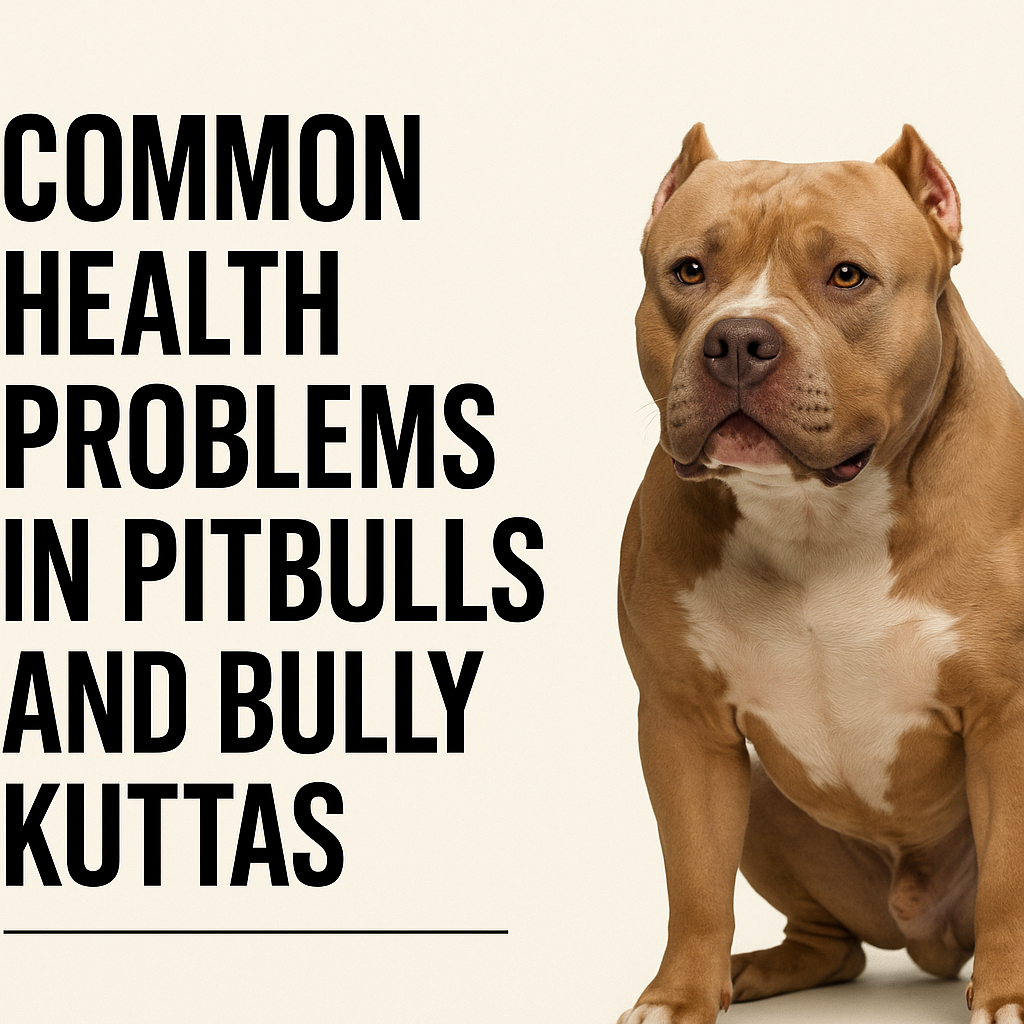If you’re a proud owner of a Pitbull or Bully Kutta, you know these breeds bring unmatched strength, loyalty, and affection into your life. But their powerful builds and unique genetics also make them prone to specific health issues.
For worried pet parents, understanding these problems—especially joint issues and skin conditions—can make all the difference in keeping your dog healthy and happy.
In this guide, we’ll dive deep into the most common health problems in Pitbulls and Bully Kuttas, how to spot them early, and proven prevention strategies, including vet recommendations.
Whether you’re searching for solutions to “Pitbull health issues” or “Bully Kutta care,” this post has you covered.
Why Health Matters for Pitbulls and Bully Kuttas
Pitbulls and Bully Kuttas are muscular, active breeds with big hearts and even bigger responsibilities for their owners. While they’re generally robust, their size, genetics, and high-energy lifestyles can lead to health challenges.
Joint problems like hip dysplasia and arthritis, along with skin conditions like allergies and hot spots, top the list of concerns.
The good news? With early detection and proactive care, you can help your dog live a long, pain-free life.
Let’s explore these issues in detail and arm you with the knowledge to spot and prevent them.
Joint Problems: Keeping Your Dog Moving Comfortably
Joint problems are a major concern for Pitbulls and Bully Kuttas due to their athletic builds and weight-bearing frames.
These issues can cause discomfort and limit mobility, but understanding them is the first step to prevention.
Hip Dysplasia: A Common Joint Challenge
Hip dysplasia is a genetic condition where the hip joint doesn’t fit properly into its socket, causing friction and wear over time.
It’s especially common in larger breeds like Bully Kuttas and some Pitbull lines.
Signs to Watch For
-
Limping or favoring one leg
-
Trouble standing up or lying down
-
Hesitation to jump, run, or climb stairs
-
A “clicking” sound when walking
Why It Happens
-
Genetics (passed down from parents)
-
Rapid growth or obesity putting stress on joints
-
Over-exercising young dogs before their bones fully develop
How to Treat It
-
Keep your dog at a healthy weight to ease joint strain
-
Use physical therapy or hydrotherapy to improve mobility
-
Ask your vet about anti-inflammatory meds or, in severe cases, surgery
Preventing Hip Dysplasia in Pitbulls
Start early to protect your dog’s joints:
-
Feed a balanced diet to avoid excess weight gain
-
Limit high-impact activities (like jumping) in puppies
-
Add Pitbull joint health supplements like glucosamine and chondroitin to support cartilage and joint health—consult your vet for the best options
Arthritis: Managing Wear and Tear
Arthritis is joint inflammation, often from aging or overuse. While it’s more common in older dogs, active Pitbulls and Bully Kuttas can develop it earlier due to their physical lifestyles.
Signs to Watch For
-
Stiffness, especially after resting
-
Swollen or tender joints
-
Reluctance to play or exercise
-
Whining or signs of pain
Why It Happens
-
Natural aging process
-
Past injuries to joints
-
Extra weight stressing the body
How to Treat It
-
Pain relief meds from your vet
-
Joint supplements to reduce inflammation
-
Low-impact activities like swimming
-
Warm compresses for comfort
Prevention Tips
-
Maintain a healthy weight with a vet-recommended diet for Pitbull joint problems—look for foods with omega-3s to fight inflammation
-
Regular, gentle exercise to keep joints flexible
-
Routine vet visits to catch early signs
Skin Conditions: Soothing Your Dog’s Discomfort
Skin problems can be just as troubling as joint issues for Pitbulls and Bully Kuttas.
Their short coats and sensitive skin make them prone to allergies and infections, but you can manage these with care and attention.
Allergies: The Itchy Culprit
Allergies happen when your dog’s immune system overreacts to something—like food, pollen, or fleas—causing itchy, irritated skin.
Both breeds are prone to this, making it a top concern in “Bully Kutta care.”
Signs to Watch For
-
Constant scratching or licking
-
Red, inflamed skin or rashes
-
Hair loss in patches
-
Recurring ear infections
Why It Happens
-
Food triggers (e.g., grains, chicken, beef)
-
Environmental factors (e.g., dust mites, pollen)
-
Flea bites or contact with harsh chemicals
How to Treat It
-
Switch to a hypoallergenic diet to rule out food allergies
-
Use vet-prescribed antihistamines or steroids
-
Bathe with medicated shampoos
-
For Bully Kutta skin allergy treatment, ask about immunotherapy for long-term relief
Prevention Tips
-
Feed high-quality, limited-ingredient food
-
Keep your home free of dust and allergens
-
Use flea prevention year-round
-
Try natural remedies for Bully Kutta skin issues like coconut oil or oatmeal baths to calm irritation
Hot Spots: Quick-Spreading Sores
Hot spots are red, wet, infected patches of skin that flare up fast.
They’re often linked to allergies or excessive licking and can be painful for your dog.
Signs to Watch For
-
Moist, red sores
-
Intense itching or chewing
-
A bad smell from infection
Why It Happens
-
Underlying allergies
-
Poor grooming or matted fur
-
Stress or boredom causing licking
How to Treat It
-
Clean the spot with antiseptic and keep it dry
-
Apply vet-approved creams or sprays
-
Use a cone to stop further irritation
Prevention Tips
-
Groom regularly to keep the coat clean
-
Treat allergies or behavioral triggers
-
Offer toys or activities to reduce boredom
Prevention Strategies: Proactive Care for a Healthy Life
Preventing health issues in Pitbulls and Bully Kuttas is all about staying ahead of the game. Here’s how to keep your dog in top shape:
-
Watch Their Weight
Extra pounds strain joints and worsen skin problems. Stick to portioned meals and avoid table scraps. -
Schedule Vet Visits
Annual or bi-annual check-ups can catch issues early, from joint wear to skin flare-ups. -
Start Supplements Early
Joint supplements like glucosamine can protect your dog’s mobility long-term—start them as young as 1-2 years old with vet approval. -
Groom Consistently
Brush and bathe your dog to prevent skin issues. Use gentle, dog-safe products and check for irritation. -
Exercise Smart
Keep your dog active with walks or swims, but avoid overdoing it—especially with puppies or seniors.
Vet Recommendations: Expert Tips for Pet Parents
We consulted Dr. Sarah Thompson, a veterinarian with 15+ years working with bully breeds, for her expert advice on “Pitbull health issues” and “Bully Kutta care.”
-
Focus on Joints Early
“Start joint care young,” Dr. Thompson says. “Supplements like glucosamine can delay problems like hip dysplasia, especially in Bully Kuttas.” -
Pick the Right Food
“A diet with omega-3s and no fillers is key,” she advises. “It helps joints and reduces allergy risks.” -
Stay Ahead of Skin Issues
“Allergy testing can pinpoint triggers,” Dr. Thompson notes. “Natural remedies like coconut oil work wonders for mild cases.” -
Balance Exercise and Rest
“Swimming is great for joints,” she adds. “Keep your dog lean to avoid extra stress.”
Your Dog’s Health in Your Hands
Owning a Pitbull or Bully Kutta is a joy, but it comes with the duty to protect their health. Joint problems like hip dysplasia and skin conditions like allergies don’t have to define your dog’s life.
By spotting signs early—like limping or scratching—and taking steps like using Pitbull joint health supplements or natural remedies for Bully Kutta skin issues, you can keep them thriving.
Pair this with a vet-recommended diet for Pitbull joint problems and regular check-ups, and you’re set to give your loyal companion the best care possible.
Have questions or tips of your own? Share them below—we’re all in this together as worried pet parents!

